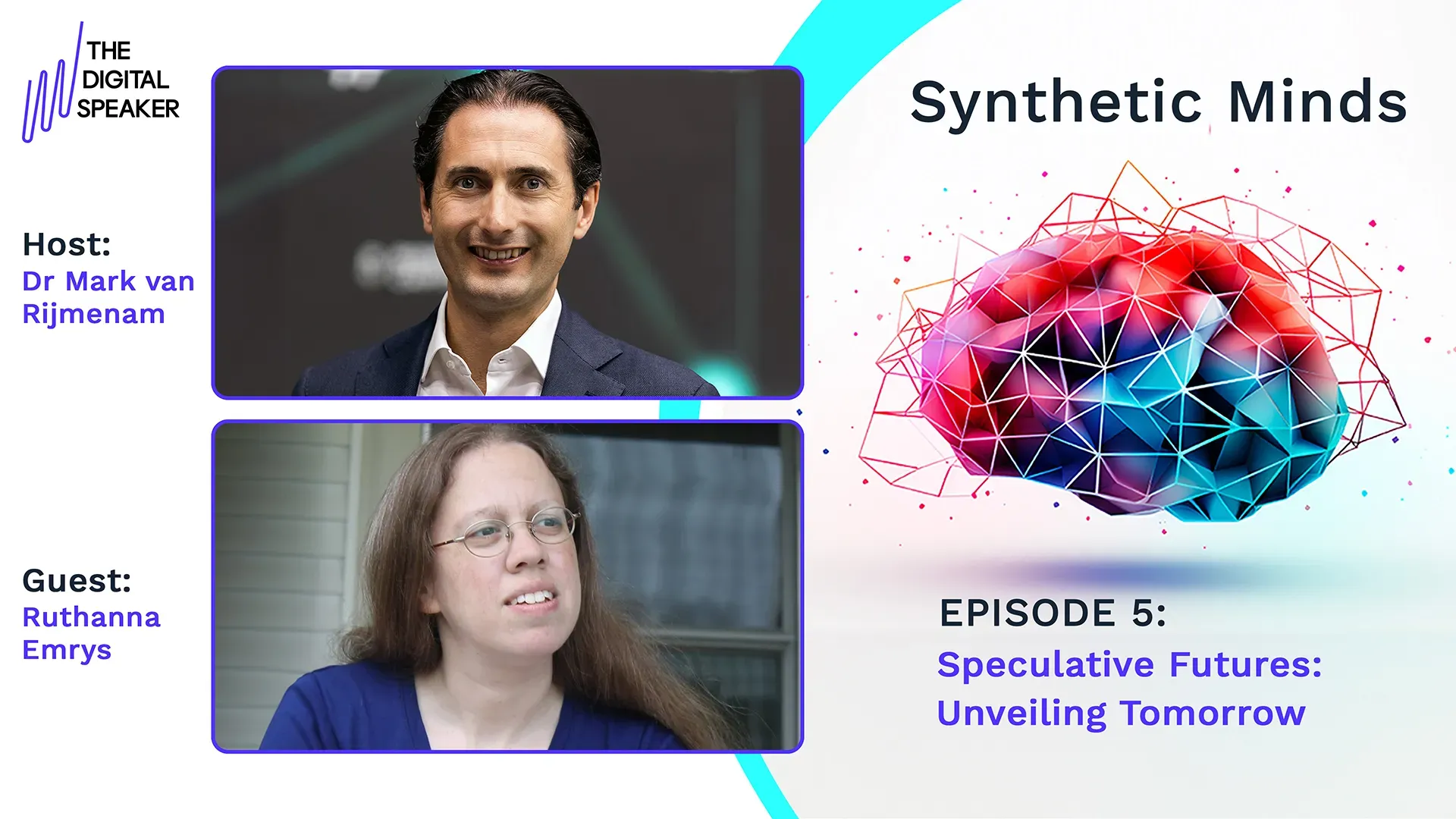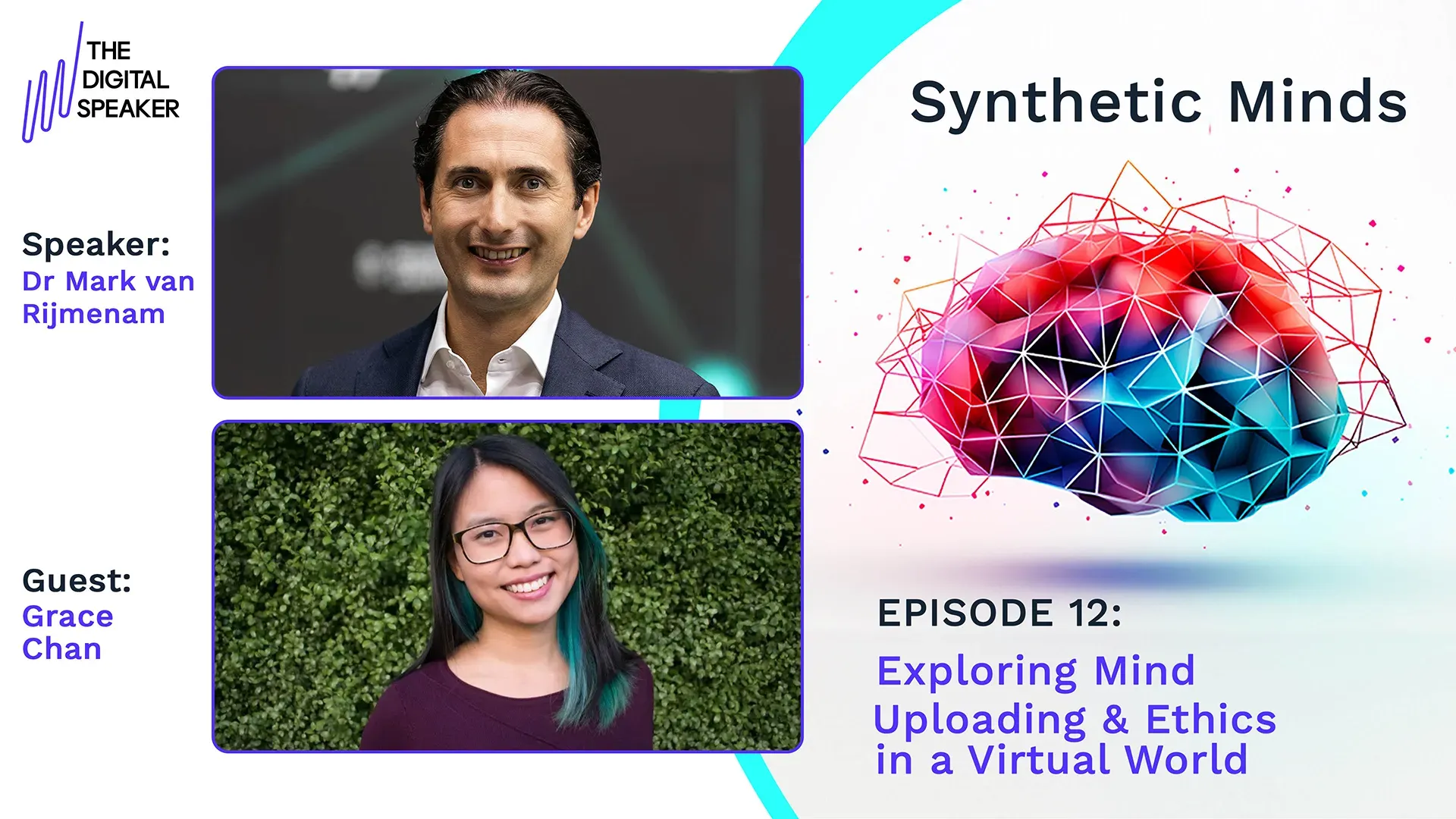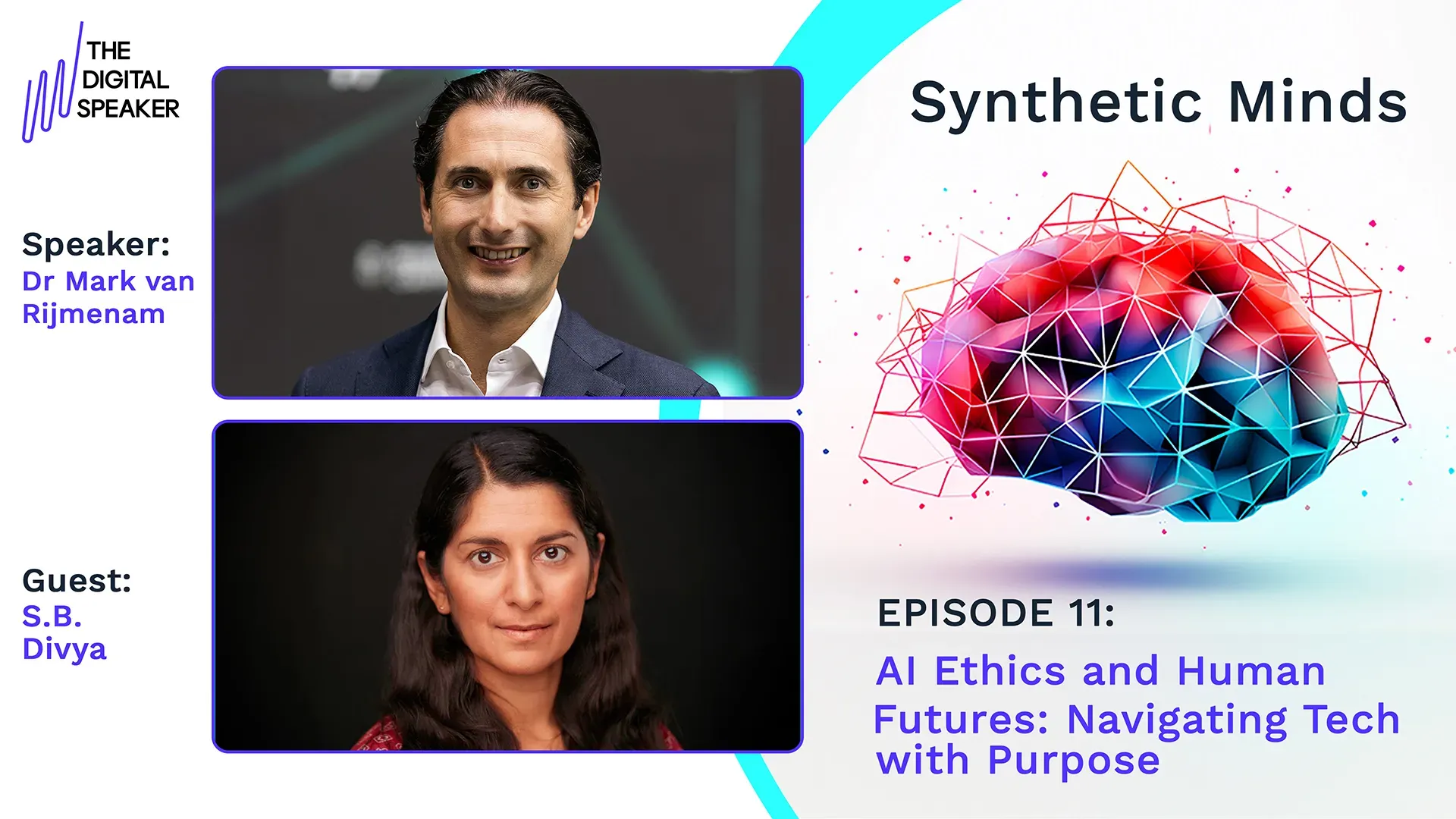Speculative Futures: Unveiling Tomorrow with Ruthanna Emrys - Synthetic Minds Podcast EP05

Welcome to another episode of Synthetic Minds, where we explore the intersections of fiction, technology, and future thinking. In this episode, we delve into the imaginative world of Ruthanna Emrys, an author known for her unique take on Lovecraftian lore and its implications for understanding complex future scenarios.
Her narratives challenge us to think deeply about identity, ethics, and societal structures—themes crucial for business leaders navigating technological transformations. Emrys’ narratives challenge us to question our assumptions and to consider the broad spectrum of possibilities that the future holds.
The Power of Speculative Fiction in Organizational Strategy
Speculative fiction offers more than just an escape into fantasy. For business leaders, it should serve as a critical tool for scenario planning and strategic foresight. “Speculative fiction,” Emrys notes, “allows us to test the limits of what we believe is possible and ethical”. This genre can help business leaders envision the impact of emerging technologies and societal shifts, encouraging a proactive rather than reactive approach to strategic planning.
Her works, notably "A Half-Built Garden," explore scenarios that compel us to rethink organizational and societal structures in response to existential threats like climate change or even alien contact.
Emrys' stories often feature characters and societies grappling with rapid technological and environmental changes, mirroring today’s business challenges. For instance, her novel "A Half-Built Garden" showcases how different communities adapt to or resist technological intrusions, providing a narrative framework for businesses to examine their own responses to innovation and disruption.
The richness of Emrys’ stories lies in their ability to frame technology not as a predetermined path but as a landscape of choices, each leading to different futures. This approach encourages leaders to embrace the complexity of strategic planning, considering optimistic and pessimistic outcomes as well as unconventional and unexpected ones. For instance, her discussion on how societies respond to alien encounters metaphorically invites us to consider how we might deal with unforeseen global challenges or the rise of superintelligence.
Embracing Complexity and Uncertainty
Using speculative fiction for scenario planning can offer businesses a way to navigate uncertainty. By analyzing how characters in Emrys' stories respond to crises, leaders can glean insights into resilience and adaptability. This method allows them to consider multiple future outcomes, preparing them to pivot or persevere as real-world conditions change.
Integrating such narratives into strategic dialogues can enhance understanding across an organization. Discussing speculative scenarios helps teams explore the potential impacts of decisions in a safe, imaginative context, fostering a culture of innovation and critical thinking.
Ethical Considerations in Futuristic Technologies
One of the central themes in Emrys' discussion is the ethical dimension of emerging technologies. She probes the psychology behind technological adoption and the narrative frameworks that shape our interactions with new tools. This perspective is crucial for leaders as it underscores the importance of aligning technological advancements with humanistic values.
“We need to think about how technologies affect not just efficiency but equity and access.”
Emrys stresses the non-inevitability of technological outcomes, advocating for a proactive stance in shaping these paths. This involves anticipating the impact of technologies like AI on our social fabric and actively deciding the direction they should take to enhance societal well-being. Her insights are a call to action for leaders to foster an organizational culture where ethical considerations are at the forefront of technological integration.
Ethical Frameworks
Drawing from Emrys' narratives, businesses can develop ethical frameworks that consider the long-term impacts of technologies on society. For example, her depiction of a world where AI influences social norms could prompt leaders to ensure their AI implementations uphold fairness and transparency.
Her stories also highlight the importance of diverse perspectives in shaping technological developments. This approach can prevent biases that might otherwise go unchecked, encouraging more inclusive and universally beneficial innovations.
Finally, Emrys stresses the importance of thoughtful governance structures to manage technological impacts. Businesses can take a cue from her books to advocate for policies ensuring technology serves the broadest good, engaging in industry dialogues to set standards prioritising ethical considerations.
Strategies for Long-Term Organizational Resilience
Translating speculative insights into real-world strategies is perhaps the most crucial step. Emrys' work encourages a holistic view of technology’s role within society, urging leaders to think beyond profit and performance metrics. Leaders might adopt narrative-based brainstorming sessions to tackle challenges, encouraging creative solutions that consider various stakeholders' perspectives.
The conversation with Emrys extends into the practical strategies organizations can employ to adapt to and shape future realities. She suggests that leaders should extend their planning beyond conventional risk assessments and consider more diverse scenarios that include radically different futures. This could involve integrating speculative fiction techniques into business strategies to unlock creative and innovative approaches to problem-solving.
Emrys highlights the importance of flexibility and openness in strategic planning, allowing for adjustments as new information and technologies emerge. This adaptability is crucial in a world where the pace of change is accelerating and the future is increasingly uncertain.
Training and Development
Utilizing speculative fiction in training programs can also enhance cognitive flexibility among employees, preparing them to adapt to unforeseen changes. For example, analyzing dilemmas faced by Emrys' characters could help teams develop critical thinking skills needed to navigate the ethical and operational complexities of new technologies.
Finally, embedding futures thinking into organizational culture through regular engagement with speculative fiction can cultivate a mindset that is continuously anticipatory and agile. This practice helps create a resilient workforce capable of contributing to sustained innovation.
Conclusion
Our discussion with Ruthanna Emrys has provided profound insights into how speculative fiction can enrich our understanding of future technologies and societal shifts. Her unique approach encourages us to explore the ethical, psychological, and strategic dimensions of emerging technologies. For business leaders, integrating these insights can lead to more robust and adaptive strategies that are prepared to navigate the complexities of the future.
We hope this episode inspires you to consider how speculative fiction can enhance your strategic planning and ethical frameworks. Don't forget to subscribe to the Synthetic Minds podcast to explore more about the fascinating intersection of science fiction and reality. Join us next time as we continue to delve into the narratives that will shape our technological and societal future.
About Ruthanna
Ruthanna Emrys is the author of A Half-Built Garden, Winter Tide, and Deep Roots, as well as co-writer of Tor.com's Reading the Weird column with Anne M. Pillsworth. She also writes radically hopeful short stories about religion, aliens, and psycholinguistics. She lives in a mysterious manor house on the outskirts of Washington, DC, with her wife and their large, strange family. There, she creates real versions of imaginary foods, gives unsolicited advice, and occasionally attempts to save the world.















